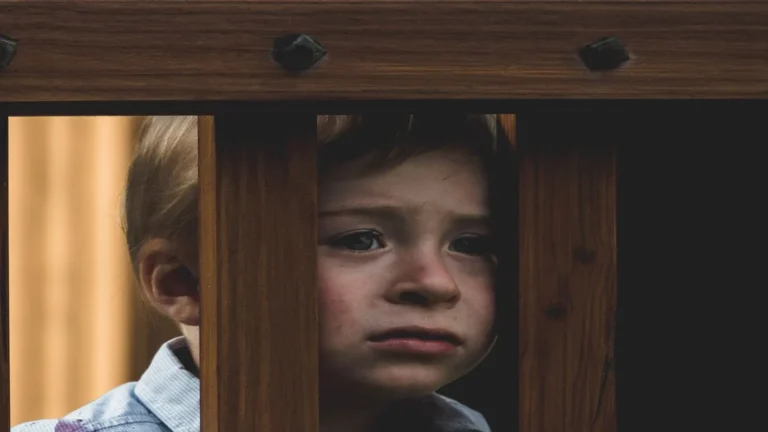How Much Sleep Does Your Child Need? The Results You Need To Know!

As parents, we all know that sleep is essential for our child’s health and well-being. But, how much sleep does a child need? It’s a question that can be perplexing, especially when you consider that children of different ages require varying amounts of sleep.
In this article, we’ll break down the recommended sleep needs for children at different ages, the consequences of not getting enough sleep, and tips for ensuring your child gets the necessary amount of shut-eye.
The Crucial Role of Sleep in Child Development
Sleep is not just a period of rest for children; it’s a vital process that fuels their growth, learning, and overall well-being. During sleep, children’s brains consolidate memories, process new information, and prepare for the next day’s challenges.
Dr. Caroline Okorie, a pediatric sleep medicine specialist at Stanford Children’s Health, emphasizes, “Sleep is essential for facilitating learning, improving attention, and consolidating memories. It’s a cornerstone of healthy development at all stages of childhood.”
Beyond cognitive benefits, sleep plays a crucial role in physical health. It supports the immune system, helping children fight off infections and illnesses. Moreover, adequate sleep is linked to better metabolism and a reduced risk of obesity in later life.
Rachel Mitchell, CEO of My Sweet Sleeper, a maternity and sleep consulting company, adds, “When children get enough sleep, they tend to be in a better mood, their bodies are better equipped to fight off infections, and their ability to learn and remember improves significantly.”
How Much Sleep Do Babies Need 0-3 Months
0-3 Months: Newborns and Sleep Newborns typically need 14-17 hours of sleep per 24-hour period. However, their sleep patterns are erratic, with short sleep cycles and frequent wakings.
“The first few months of life are a unique period in a baby’s sleep journey,” Mitchell observes. “Fresh from the womb, newborns spend an extraordinary amount of time in slumber.
This isn’t mere rest – it’s a crucial process of adaptation. Their tiny bodies and developing brains are working overtime to process the flood of new sensations and experiences in the world beyond the womb.
As a result, these little ones often seem to be in an almost constant state of drowsiness, cycling through brief periods of wakefulness before succumbing once again to sleep’s embrace.”. “Their sleep is crucial for supporting their fast-paced development.“
How Much Sleep Babies Need From Age 4-12 Months
4-12 Months: Establishing Sleep Patterns Babies in this age range require 12-16 hours of sleep per 24-hour period, including naps. “As babies transition from the newborn stage, their sleep patterns begin to evolve,” Dr. Okorie points out.
“Around the four-month mark, we often see the emergence of more structured sleep rhythms. Infants start to grasp the concept of day and night, leading to longer stretches of nighttime sleep.
Simultaneously, their daytime sleep organizes into more predictable patterns, typically featuring two to three distinct nap periods. This shift marks the beginning of sleep consolidation, a crucial developmental milestone that lays the groundwork for more mature sleep cycles in the months and years to come.”
How Much Sleep Toddlers Need From Ages 1-2 Years
1-2 Years: Toddler Sleep Challenges Toddlers need 11-14 hours of sleep per 24-hour period. This stage often brings new sleep challenges.
“The boundless energy of toddlers can often lead to an unexpected paradox,” notes Dr. Okorie. “Their constant motion and exploration throughout the day can result in overtiredness.
When this happens, instead of simply falling asleep, many toddlers exhibit what might seem like a second wind. They may become unusually active, prone to emotional outbursts, or unusually cranky. It’s their body’s way of fighting against the overwhelming need for sleep.”
How Much Sleep Kids Need From Ages 3-5 Years
3-5 Years: Preschooler Sleep Needs Preschoolers require 10-13 hours of sleep per 24-hour period. By age 5, most children have dropped their naps. Mitchell advises, “It’s important to make adjustments to bedtimes based on when the child woke up and their activity level during the day.”
How Much Sleep Kids Need From Ages 6-12 Years
6-12 Years: School-Age Sleep Requirements School-aged children need 9-12 hours of sleep per night. Dr. Okorie suggests, “Consider the time your child needs to wake up for school or activities, and then count backward to determine an appropriate bedtime.”
How Much Sleep Kids Need From Ages 13-18 Years
13-18 Years: Teenage Sleep Challenges Teenagers require 8-10 hours of sleep per night. However, many struggle to get enough due to biological changes, academic pressures, and increased use of technology.
“It’s important to remember that teens still need to have adequate sleep for healthy brain development,” Mitchell emphasizes.

Signs of Sleep Deprivation in Children
Recognizing sleep deprivation in children is crucial for addressing the issue promptly. Here are some key signs to watch for:
Dr. Okorie notes, “Sleep-deprived children may struggle to regulate their emotions and respond more strongly to even mild negative stimuli. They may seem clingier and demand increased attention.”
What are some common sleep problems?
Remember that early recognition and management of sleep disorders can prevent complications and improve overall well-being for both children and their families!

Creating a Sleep-Friendly Environment
Establishing a sleep-friendly environment is crucial for promoting good sleep habits. Consider the following tips:
Ronee Welch, founder and CEO of Sleeptastic Solutions, advises, “A consistent bedtime routine signals to the child’s body and mind that it’s time to wind down and prepare for sleep.”
Addressing Common Sleep Challenges
Every child may face sleep challenges at different stages. Here are some common issues and strategies to address them:
Mitchell emphasizes, “Consistency is key when addressing sleep challenges. It’s important to remain patient and remember that developing healthy sleep habits is a process.”
The Impact of Technology on Children’s Sleep
Technology significantly challenges children’s sleep. The blue light emitted by screens can suppress melatonin production, making it harder for children to fall asleep. Moreover, engaging content can be overstimulating, keeping kids awake past bedtime.
Dr. Okorie recommends, “Establishing a ‘tech curfew’ at least an hour before bedtime. This allows the brain to wind down and prepare for sleep.”
Consider these strategies to manage technology use:
What children eat and how much they move during the day can significantly impact their sleep quality. A balanced diet rich in nutrients supports overall health and can promote better sleep. Foods containing tryptophan, magnesium, and melatonin can be particularly beneficial.
Regular physical activity is also crucial for good sleep. Exercise helps tire the body, reduce stress, and regulate circadian rhythms. However, timing is important. Intense exercise too close to bedtime can be stimulating and make it harder to fall asleep.
Welch suggests, “Aim for at least an hour of physical activity daily, but try to complete vigorous exercise at least three hours before bedtime.”
When to Seek Professional Help
While occasional sleep issues are normal, persistent problems may require professional intervention. Consider consulting a pediatrician or sleep specialist if:
Remember, every child is unique, and what works for one may not work for another. The key is being patient, consistent, and attentive to your child’s needs. By prioritizing sleep and implementing healthy sleep habits, you’re setting your child up for success in all areas of life.
What Time Should My Child Go to Bed?
As a parent, one of the most important things you can do for your child’s health and well-being is to establish a consistent bedtime routine. But what time should you put them to bed, especially if they’re 5 years old and still taking naps? Let’s take a look.
Preschoolers (3-5 years old)
Preschoolers require between 10-13 hours of sleep a day, including naps. As your child gets closer to age 5, they may start to resist napping or may not need one at all. At this age, it’s recommended that they go to bed between 7-8 pm.
Bedtime Resistance
If your child is resistant to going to bed at their designated bedtime, there are a few things you can do to help. Establishing a consistent bedtime routine, creating a sleep-friendly environment, and avoiding stimulating activities such as screen time before bed can all help promote better sleep habits.
Adjusting Bedtime
If you find that your child is consistently waking up tired or having trouble falling asleep at their designated bedtime, it may be time to adjust their bedtime. Gradually moving their bedtime earlier or later can help ensure that they’re getting the recommended amount of sleep for their age group.
Naps
If your child is still taking naps at age 5, it’s important to ensure that their total amount of sleep per day aligns with the recommended amount for their age group. A nap of 1-2 hours during the day is usually sufficient for most preschoolers.
Tips for Ensuring Your Child Gets Enough Sleep
Here are some tips to help your child get the necessary amount of sleep:
1. Establish a Consistent Bedtime Routine
A consistent bedtime routine can help signal to your child that it’s time to wind down and get ready for sleep. Try to establish a set bedtime each night and incorporate calming activities such as reading a book or taking a warm bath.
2. Create a Sleep-Friendly Environment
Ensure that your child’s bedroom is a comfortable and relaxing space. This can include making sure the room is cool, dark, and quiet, as well as using a comfortable mattress and pillows.
3. Encourage Physical Activity
Regular physical activity can help tire your child out and promote better sleep. Encourage your child to participate in age-appropriate physical activities throughout the day, such as playing outside or participating in a sports team.
4. Limit Screen Time Before Bed
The blue light emitted by electronic devices can interfere with your child’s natural sleep-wake cycle. Try to limit your child’s screen time in the hours leading up to bedtime, and encourage them to engage in calming activities instead.
5. Monitor Caffeine Intake
Caffeine can interfere with your child’s ability to fall asleep and stay asleep. Avoid giving your child caffeinated beverages such as soda or energy drinks, especially in the hours leading up to bedtime.
Conclusion
Sleep is incredibly important for kids’ health and growth. It’s not just about rest – sleep helps children’s bodies and minds develop properly. When kids get enough sleep, they’re healthier, happier, and do better in school.
As parents, we can help our kids sleep well by sticking to regular bedtimes, making their rooms cozy for sleep, and cutting down on screens before bed. It might take some effort, but it’s worth it. Good sleep habits set kids up for success in all areas of life.
Remember, every child is different, so it might take some trial and error to find what works best for your family. The key is to make sleep a priority and be consistent. By doing this, we’re giving our kids a great foundation for a healthy, happy life.
Frequently Asked Questions
What should I do if my child is still resisting bedtime even with a consistent routine?
If your child is still resistant to going to bed, try to make the bedtime routine more enjoyable and engaging for them. You can also try rewarding good behavior at bedtime or using a sticker chart to track progress.
Can I let my child stay up later on weekends?
It’s best to stick to a consistent bedtime routine as much as possible, even on weekends. This can help your child maintain healthy sleep habits and avoid disrupting their natural sleep-wake cycle.
Is it okay if my child takes a nap every day?
Yes, napping can be beneficial for young children, but it’s important to make sure that their total amount of sleep per day aligns with the recommended amount for their age group.
What are some tips for creating a sleep-friendly environment for my child?
Creating a cool, dark, and quiet bedroom environment can help promote better sleep. Additionally, using a comfortable mattress and pillows, and avoiding stimulating activities such as screen time before bed can also help.
How can I help my child wind down before bedtime?
Establishing a consistent bedtime routine that includes calming activities such as reading a book or taking a warm bath can help signal to your child that it’s time to wind down and get ready for sleep.




